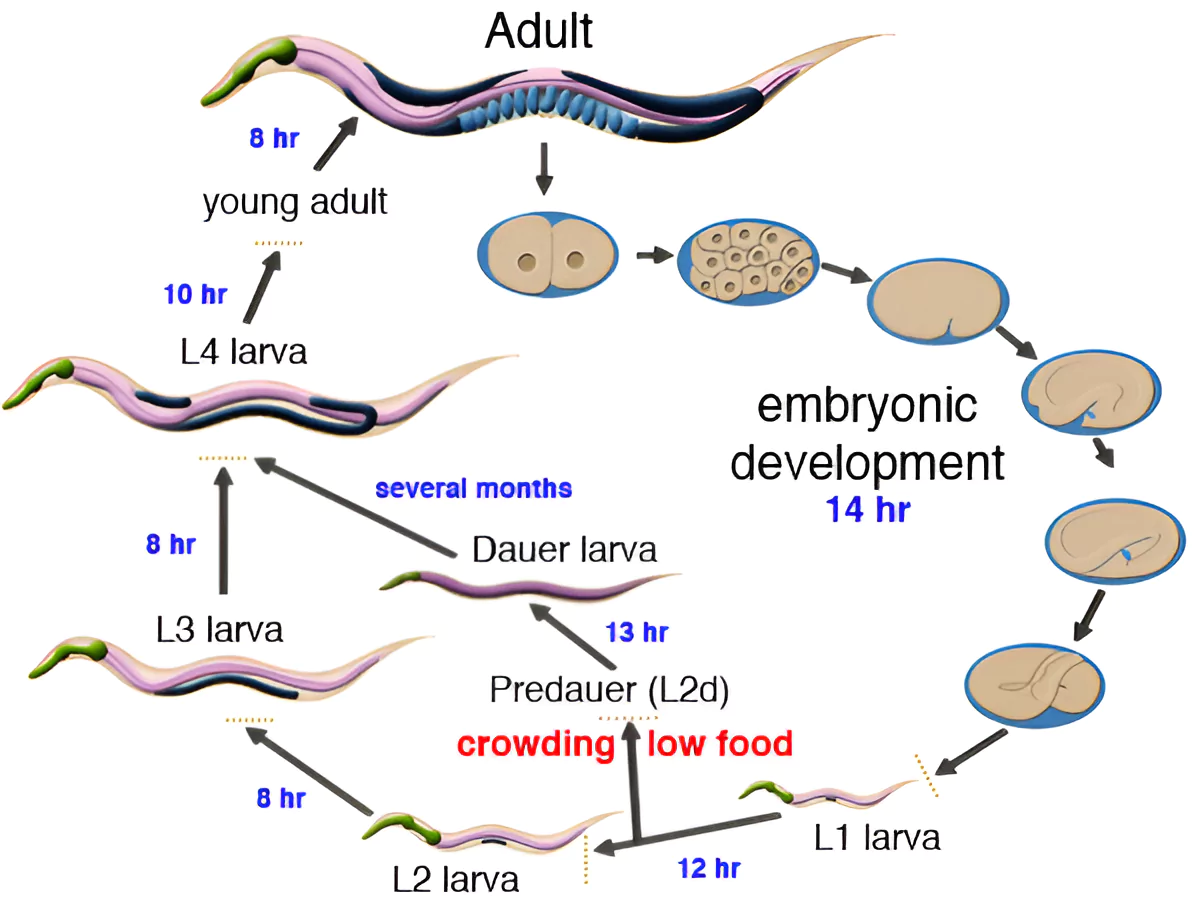Context
Caenorhabditis elegans, also called “the worm,” is used a lot in science to study how brains and cells work.
- It was the first animal to have all its genes and brain connections figured out.
- These worms grow fast and become adults in just 3-5 days after being born from eggs.
About Caenorhabditis elegans

Caenorhabditis elegans is a small, transparent nematode. It lives freely in temperate soil environments.
- The name C. elegans comes from a blend of Greek and Latin words meaning “recent,” “rod-like,” and “elegant.”
- Key Traits of Caenorhabditis elegans:
- C. elegans is an unsegmented pseudocoelomate organism, meaning it lacks segmented body divisions and has a fluid-filled body cavity.
- It does not have respiratory or circulatory systems, distinguishing it from more complex organisms.
Enroll now for UPSC Online Course
Nemotode
- It is also known as roundworms or eelworms.
- Habitat: They reside in soil, freshwater, marine environments, and within other organisms.
- Eating habit: feeding on microorganism
|
-
- The majority of Caenorhabditis elegans individuals are hermaphrodites, capable of producing both eggs and sperm.
- However, there are also a few males among the population.
- Male Caenorhabditis elegans possess unique tails specialized for mating, which include spicules, structures used during copulation.
About Pseudomonas vranovensis
- Pseudomonas vranovensis is a harmful bacteria found where Caenorhabditis elegans naturally lives.
- This bacterium produces a tiny molecule called sRNA.
- When the worms eat this bacterium, they also take in the sRNA.
- The sRNA changes the worms’ eating habits so they avoid the harmful bacteria in the future.
- P. mendocina:
- P. mendocina, another bacterium in C. elegans’ habitat, is not harmful but a food source.
- Worms trained to avoid pathogenic P. vranovensis also avoided feeding on non-pathogenic P. mendocina.
- Researchers suggest that the “loss of memory” around the fifth generation might occur to re-learn the advantage of consuming P. mendocina.
About DNA and RNA
- DNA is like a ladder made of phosphate and sugar molecules.
- Each sugar unit is attached with four types of chemical bases: adenine (A), cytosine (C), guanine (G), and thymine (T).
- P. vranovensis bacteria have about 6-7 million rungs in their DNA.
- It contains around 5,500 genes.
- Each gene provides instructions for making a protein.
- RNA is similar to a half-ladder or a comb, with a spine made of phosphate and sugar molecules, and four types of bases: A, C, G, and uridine (U).
- During a process called transcription, a cell copies the sequence of bases in a gene from DNA to RNA.
- This RNA, known as messenger RNA (mRNA), carries the genetic information to ribosomes.
- sRNA and Gene Expression:
- Some genes produce sRNA instead of mRNA and proteins.
- sRNA can interact with proteins and other RNAs.
- It influences gene expression positively or negatively.
- Experiment with C. elegans:
- Researchers at Princeton University discovered that C. elegans worms ingested a 124-tine sRNA from P. vranovensis bacteria.
- This sRNA reduced the expression of a gene called maco-1 in the worms.
- It is also found in humans and plays a crucial neurological role.
Link between Caenorhabditis elegans and Human Genome:
- Genes identified in Caenorhabditis elegans that affect its development are also found in the human genome.
- Mutations in these genes have been linked to limb deformities in humans.
Enroll now for UPSC Online Classes
![]() 14 May 2024
14 May 2024
